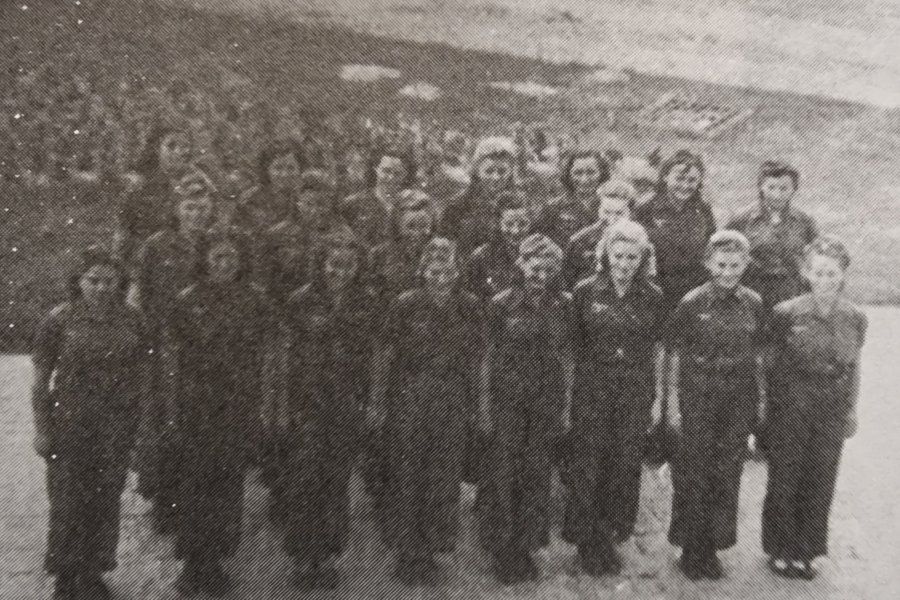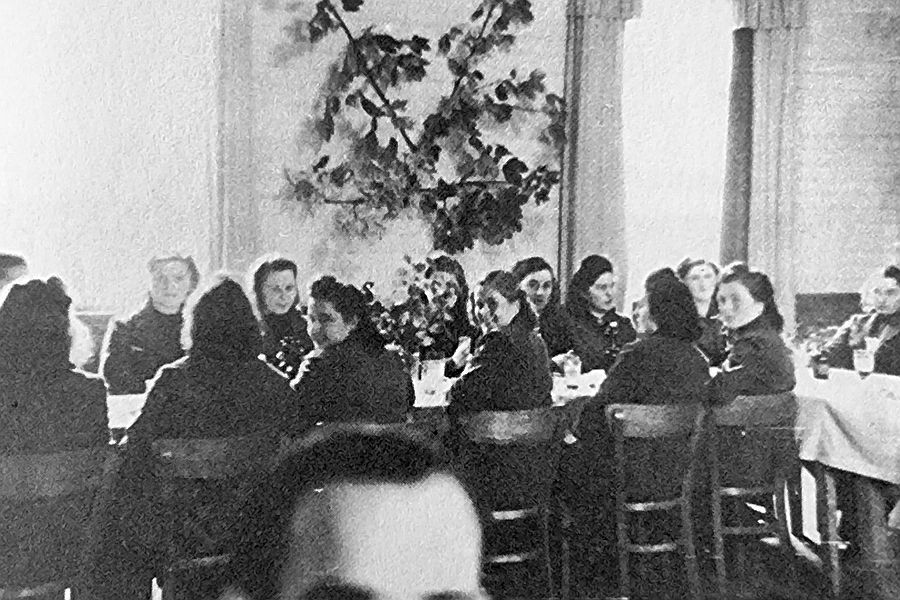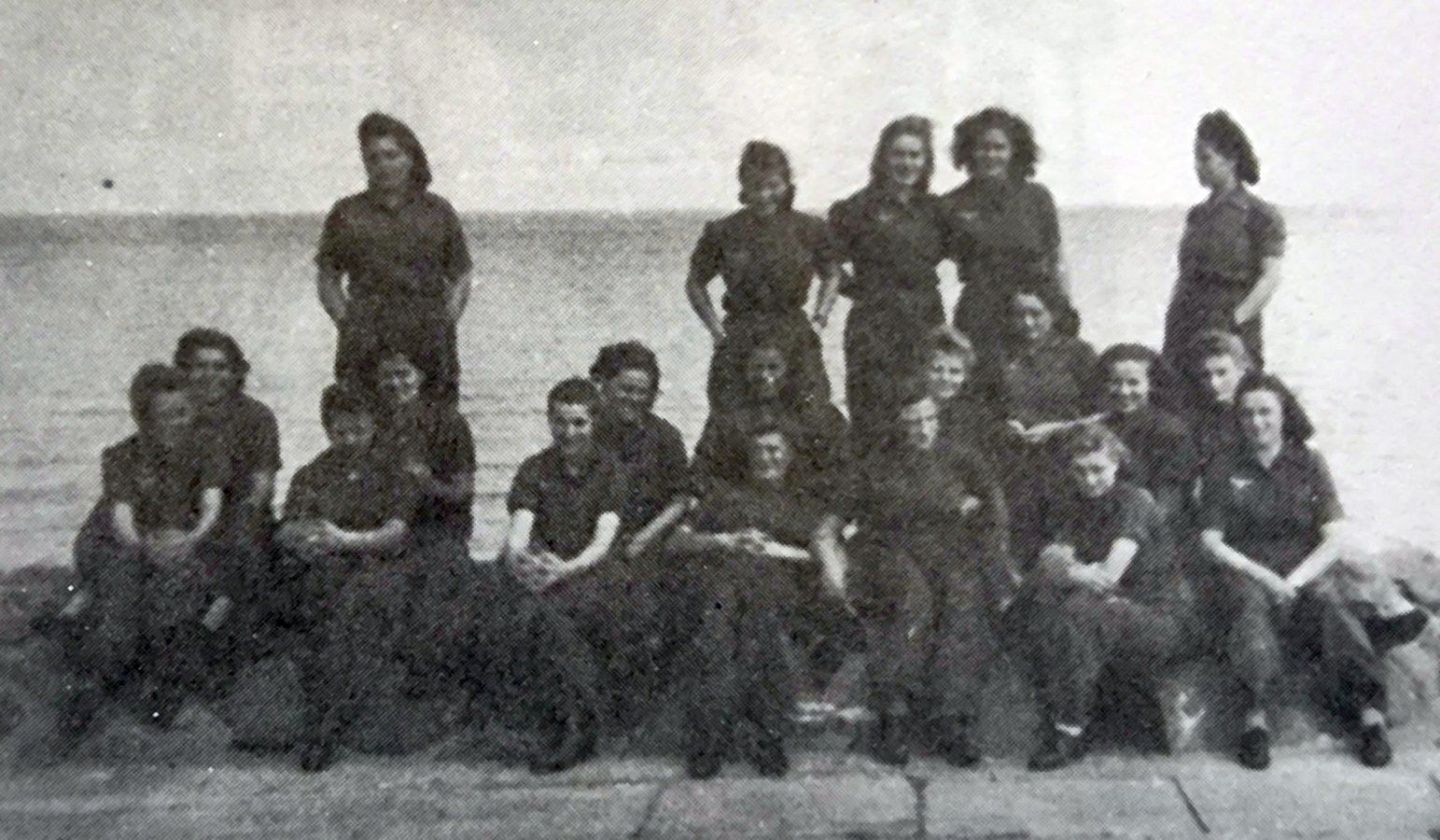
It wasn't just men who were deployed in the anti-aircraft batteries of the time; from 1939 onwards, women could also volunteer to join the Wehrmacht as assistants. In the first years of the war, they were not allowed to be deployed directly in combat at the front, but they could take over the positions of soldiers who became available at home. In the naval anti-aircraft divisions, for example, they held posts such as listening and searchlight duties, or worked directly at the guns, and did other tasks. Female naval assistants were also deployed in the Cuxhaven batteries at the time. However, in the accommodation area, care was taken to ensure that they were kept at a suitable distance from their male comrades. In the example of the Kugelbake position, however, unlike the artillerymen, their accommodation was in the staff building outside Fort Kugelbake and not directly next to the guns.

Marinehelferinnen der Batterie Kugelbake. Ihre Bezeichnung in der Soldatensprache war beispielsweise "Blitzmädels". Eine Spitzname der sich aus dem Wappen der Nachrichteneinheiten, einem Blitz zurückführen lässt.
Fotoquelle: Marinehelfer in der Batterie Kugelbake / 1995

Marine helpers: ?, ?, M.Schröder, A.Osinski, Anita X(?),?, ?, I.ArIt, ?, H.Schöler,I.Zrischling, W.Hungerland.M.Reger.X.Rose.Photo source: Marine helpers in the Kugelbake battery / 1995
Die Marinehelferinnen in der Batterie Kugelbake
When the female naval assistants came to the battery, there were initially great concerns. Girls aged 17 to 20 were a problem for men who lived away from their families for months. So they were initially given accommodation outside the battery. They were assigned the eastern part of the staff barracks. The battery management attached great importance to creating a certain separation in terms of work, as far as possible. At joint celebrations in the battery, the naval artillerymen, the female naval assistants and the male naval assistants sat in separate groups at the tables. On duty, separation and distance were always ensured. In their free time, however, the boundaries became blurred. And yet the presence of the female assistants added a little salt to the soup of community life.
Die Marinehelferin W.H. erinnert sich nach 50 Jahren an die Zeit in der Kugelbake
In April 1943 I received my call-up order. I was 17 at the time. My first place of service and training was Leer in East Frisia. A large barracks became our accommodation. From there we went to Heligoland for three months of training. After a short stay in Rügenwalde, we, around 20 to 25 female naval assistants, were transferred to the Kugelbake battery in Cuxhaven at the end of 1943. In the course of the following time there were assignments, but I stayed in the battery for almost two years, until the end in 1945. Our duty consisted of level crossing watch, i.e. telephone duty in the command transmission at the hatch cabinet, the lookout, watch on Flak-Ost and control station 1, work on the Kleinkog, the calculator 41 and the E-measuring device. Only the artillerymen, the naval assistants and the Russians were at the guns, but no naval assistants. We were relieved at the level crossing watch every three hours. Our tasks also included taking down the reports that came in about air traffic, forwarding the alarm levels and writing down the Balta reports. We had to record the text and time very quickly. Sometimes I couldn't keep up with normal writing from dictation and had to resort to my shorthand skills. Unfortunately, this was not quite what Sergeant Matthäus wanted, because he had no idea about shorthand. So every time I checked, he would scold me and, as was his way, he would try to expose and embarrass me in front of the others. When I was assigned to night duty, I was always very scared on the way from the accommodation to the office room. It was pitch black because of the blackout and when I saw the rats scurrying across the path, I would scream and run as if my life depended on it. The shock at the level crossing station. Someone had obviously noticed that I was easily frightened and wanted to play a trick on me. I was on level crossing watch and was sitting alone in front of the flap cabinet when there was a knock on the door. After I said "Come in!" nothing happened. There was another knock. When nothing happened after I repeated "Come in!" I stood up and went to the door. Unsuspectingly I opened it and let out a scream. In front of me, out of the darkness, stood an illuminated face. It was a hollowed-out pumpkin with a candle inside. My knees went weak and I had to sit down. Despite my intensive research I never found out who played this trick on me. Marinehelferin WH

On the stone dam of the promenade of Grimmershörnbucht.Photo source: Marinehelfer in the Kugelbake battery / 1995


